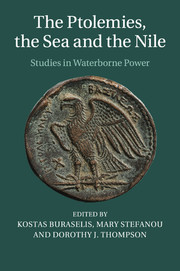21 results
Chapter 19 - Federalism and the sea. Thekoinaof the Aegean islands
-
-
- Book:
- Federalism in Greek Antiquity
- Published online:
- 05 November 2015
- Print publication:
- 05 November 2015, pp 358-376
-
- Chapter
- Export citation
D. Bosnakis and K. Hallof EdsInscriptiones Graecae: consilio et auctoritate Academiae scientiarum Berolinensis et Brandenburgensis editae. 12, Inscriptiones Graecae insularum Maris Aegaei praeter Delum. Fasc. 4, Inscriptiones Coi Calymni insularum Milesiarum. Pars 2, Inscriptiones Coi insulae: catalogi, dedicationes, tituli honorarii, termini.Berlin: De Gruyter, (2012). Pp. vi + 303 + ix. €299. 9783110222272.
- Part of
-
- Journal:
- The Journal of Hellenic Studies / Volume 134 / 2014
- Published online by Cambridge University Press:
- 02 October 2014, p. 234
- Print publication:
- 2014
-
- Article
- Export citation
Illustrations
-
- Book:
- The Ptolemies, the Sea and the Nile
- Published online:
- 05 June 2013
- Print publication:
- 04 July 2013, pp vii-vi
-
- Chapter
- Export citation
Bibliography
-
- Book:
- The Ptolemies, the Sea and the Nile
- Published online:
- 05 June 2013
- Print publication:
- 04 July 2013, pp 232-258
-
- Chapter
- Export citation
Chapter 1 - Introduction
-
-
- Book:
- The Ptolemies, the Sea and the Nile
- Published online:
- 05 June 2013
- Print publication:
- 04 July 2013, pp 1-18
-
- Chapter
- Export citation
Maps
-
- Book:
- The Ptolemies, the Sea and the Nile
- Published online:
- 05 June 2013
- Print publication:
- 04 July 2013, pp vii-vi
-
- Chapter
- Export citation
Abbreviations
-
- Book:
- The Ptolemies, the Sea and the Nile
- Published online:
- 05 June 2013
- Print publication:
- 04 July 2013, pp xv-xviii
-
- Chapter
- Export citation
Index
-
- Book:
- The Ptolemies, the Sea and the Nile
- Published online:
- 05 June 2013
- Print publication:
- 04 July 2013, pp 259-274
-
- Chapter
- Export citation
Contents
-
- Book:
- The Ptolemies, the Sea and the Nile
- Published online:
- 05 June 2013
- Print publication:
- 04 July 2013, pp v-vi
-
- Chapter
- Export citation
The Ptolemies, The Sea and The Nile - Half title page
-
- Book:
- The Ptolemies, the Sea and the Nile
- Published online:
- 05 June 2013
- Print publication:
- 04 July 2013, pp i-ii
-
- Chapter
- Export citation
The Ptolemies, the Sea and the Nile - Title page
-
-
- Book:
- The Ptolemies, the Sea and the Nile
- Published online:
- 05 June 2013
- Print publication:
- 04 July 2013, pp iii-iii
-
- Chapter
- Export citation
Copyright page
-
- Book:
- The Ptolemies, the Sea and the Nile
- Published online:
- 05 June 2013
- Print publication:
- 04 July 2013, pp iv-iv
-
- Chapter
- Export citation
Figures
-
- Book:
- The Ptolemies, the Sea and the Nile
- Published online:
- 05 June 2013
- Print publication:
- 04 July 2013, pp vii-vii
-
- Chapter
- Export citation
Preface
-
- Book:
- The Ptolemies, the Sea and the Nile
- Published online:
- 05 June 2013
- Print publication:
- 04 July 2013, pp xiii-xiv
-
- Chapter
- Export citation
Contributors
-
-
- Book:
- The Ptolemies, the Sea and the Nile
- Published online:
- 05 June 2013
- Print publication:
- 04 July 2013, pp x-xii
-
- Chapter
- Export citation
Tables
-
- Book:
- The Ptolemies, the Sea and the Nile
- Published online:
- 05 June 2013
- Print publication:
- 04 July 2013, pp viii-ix
-
- Chapter
- Export citation
Chapter 6 - Ptolemaic grain, seaways and power
-
-
- Book:
- The Ptolemies, the Sea and the Nile
- Published online:
- 05 June 2013
- Print publication:
- 04 July 2013, pp 97-107
-
- Chapter
- Export citation

The Ptolemies, the Sea and the Nile
- Studies in Waterborne Power
-
- Published online:
- 05 June 2013
- Print publication:
- 04 July 2013
(K.) Scherberich Koinè symmachía. Untersuchungen zum Hellenenbund Antigonos' III. Doson und Philipps V. (224–197 v. Chr.) (Historia Einzelschriften 184). Stuttgart: Steiner, 2009. Pp. 254. €58. 9783515094061.
-
- Journal:
- The Journal of Hellenic Studies / Volume 132 / November 2012
- Published online by Cambridge University Press:
- 17 September 2012, pp. 228-229
- Print publication:
- November 2012
-
- Article
- Export citation
A. Lintott, Imperium Romanum: Politics and Administration. London and New York: Routledge, 1993. Pp. xv + 247, 15 pls. ISBN 0-415-01594-4 (bound); 0-415-09375-9 (paper). £35.00 (bound); £10.99 (paper).
-
- Journal:
- The Journal of Roman Studies / Volume 85 / November 1995
- Published online by Cambridge University Press:
- 14 March 2012, pp. 253-254
- Print publication:
- November 1995
-
- Article
- Export citation

